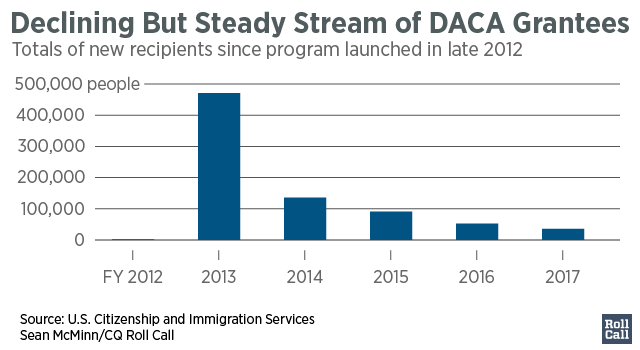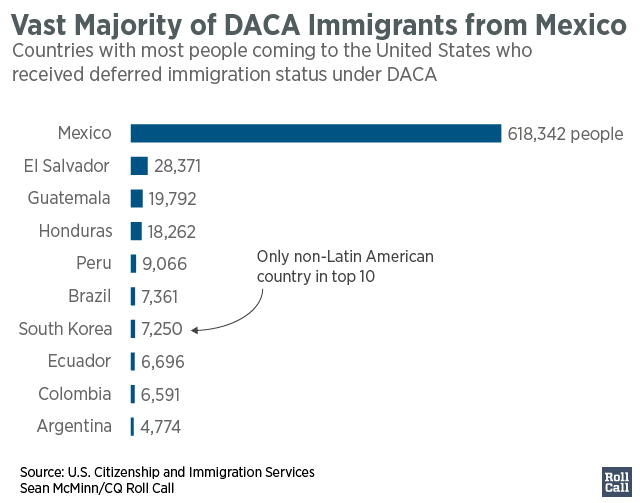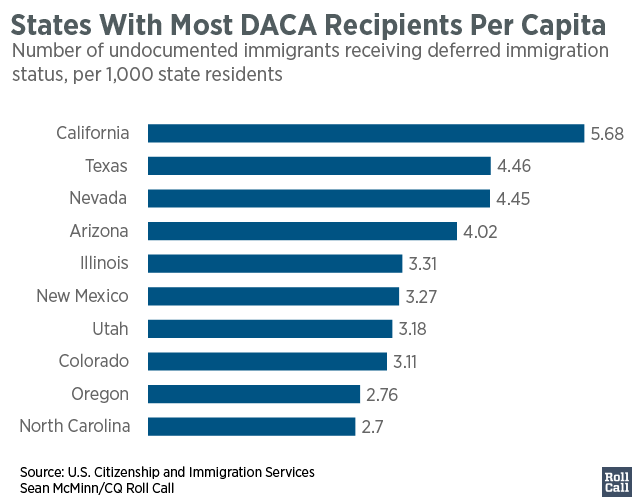Battle Lines Forming on DACA Fix
Differences emerge on what an immigration bill should include

Updated 9:27 p.m. | Congressional Republicans and Democrats were quick to promise legislative action to protect children of undocumented immigrants after the Trump administration announced Tuesday it would end an Obama-era program that sheltered them from deportation. But lawmakers did not agree on what a bill should include.
The battle lines have already started taking shape, with lawmakers divided in three main camps: those who want to swiftly pass stand-alone legislation to provide children of undocumented immigrants with permanent legal status under certain conditions; those who want Congress to address the issue in a comprehensive overhaul of the immigration system; and those who want something in between.
The mixed messaging on Tuesday seemed to dash any hope that Congress could address the issue quickly, especially with GOP leaders suggesting they’d like to see Congress do more than just fix the problems that rescinding the Deferred Action for Childhood Arrivals, also known as DACA, will create.
The program, implemented through a 2012 executive action by President Barack Obama, provides work permits and social security numbers to almost to 800,000 individuals who were brought to the United States illegally as children.

The Trump administration said they plan to phase out DACA over six months, a period they believe should provide Congress with enough time to take legislative action.
But such a task will be easier said than done, as some lawmakers have already seized on the opportunity to outline their hard-line positions on a comprehensive immigration overhaul that includes provisions to beef up border security and enforcement of existing immigration laws.
And with a number of major legislative items on the docket for the next month, the issue has the potential to torpedo an already jampacked calendar.
Senate Majority Leader Mitch McConnell did not name a DACA fix or larger immigration bill Tuesday when outlining September’s to-do list.
“These are the president’s immediate priorities: Pass disaster relief. Prevent a default. Fund the government. They are my immediate priorities as well,” the Kentucky Republican said.
GOP leaders want more
McConnell, in a separate statement on the DACA program, suggested that Congress would step in but he didn’t specify how or when.
“President Obama wrongly believed he had the authority to re-write our immigration law,” he said. “Today’s action by President Trump corrects that fundamental mistake. This Congress will continue working on securing our border and ensuring a lawful system of immigration that works.”
McConnell’s reference to border security and ensuring the immigration system works suggests he would not support a standalone measure. House Speaker Paul D. Ryan suggested the same in a statement.
“Their status is one of many immigration issues, such as border security and interior enforcement, which Congress has failed to adequately address over the years,” the Wisconsin Republican said of the individuals covered under the program. “It is my hope that the House and Senate, with the president’s leadership, will be able to find consensus on a permanent legislative solution that includes ensuring that those who have done nothing wrong can still contribute as a valued part of this great country.”

President Donald Trump also wants Congress to take a more comprehensive approach, White House Press Secretary Sarah Huckabee Sanders told reporters Tuesday.
“We can’t take just a one-piece fix,” she said. “We’ve got to do an overall immigration reform that’s responsible and, frankly, that’s lawful. And that’s what the president wants to see Congress do.”
Contentious issue
Immigration is a contentious issue for the GOP, especially in the House, where a majority of Republicans believe enhanced border security and enforcement of existing laws need to precede any legislative action on immigrants’ legal status.
House Republicans in 2013 declined to take up the Senate-passed immigration overhaul, instead advocating a more piecemeal approach that would start with border security-focused legislation that they never produced.
That approach is one many House Republicans still prefer, although the six-month time clock the administration has provided for legislative action on DACA may make separate bills unfeasible.
For that reason, any legislative fix to DACA is likely to become intertwined with other immigration issues — including Trump’s push to construct a wall along the southern border.
Republicans need Democratic votes in the Senate to fund the border wall, and the DACA program may be their best point of leverage. In the House, Ryan may not be able to pass a standalone fix without losing the votes of more than half of his conference, a move that would certainly frustrate rank-and-file Republicans and could ultimately endanger his speakership.
The political dynamics will certainly play into whatever approach the GOP decides to pursue.
Democrats push standalone
Democrats, knowing that the GOP will try to push for border wall funding or other extractions for a DACA fix, said Congress should immediately bring up bipartisan legislation to provide permanent legal status and a path to citizenship for individuals covered by DACA.
“Speaker Ryan and the Republican House leadership must bring the DREAM Act to the floor for a vote without delay,” House Minority Leader Nancy Pelosi said in a statement.
The California Democrat and Senate Minority Leader Charles E. Schumer will hold a press conference Wednesday to hammer home that message.
Lawmakers have offered various versions of the so-called DREAM Act over the years. One introduced this year by Sens. Lindsey Graham, R-S.C., and Richard J. Durbin, D-Ill., would provide amnesty and a path to citizenship for individuals in the country under the DACA program.
Many conservative lawmakers do not support a path to citizenship, which is one of the reasons the bill has not yet been enacted into law. The obstacles to its passage are even greater with Trump in the White House and Republicans in control of Congress.
House Minority Whip Steny H. Hoyer told reporters Tuesday that Congress needs to pass a DACA fix “much, much sooner than a six-month time frame” to provide some certainty for the affected individuals.
The Maryland Democrat predicted that if GOP leadership brought the DREAM Act to the floor, it would pass. That scenario likely assumes it has the support of a majority of Democrats and a minority of Republicans.
Hoyer acknowledged that Democrats may seek to exert some leverage over the issue but declined to provide specifics.
“I want to keep my powder pretty dry over the next few days,” he
said.
The minority whip did however hint that Democrats would not succumb to GOP pressure to fund Trump’s border wall in exchange for a DACA fix.
“Generally, there are a number of people who don’t think the wall
is a good solution,” Hoyer said, noting that it includes several Republicans as well as a majority of Democrats.
Senate Republicans react
Some Republicans seem willing to back the Democrats’ push to take up the DREAM Act, given the compressed timeline for action.
“We’re going to deal with the DREAM Act kids first,” Graham said Tuesday.
“But to get to the parents, you’re going to have to have a comprehensive
solution in place,”the South Carolina Republican said. “We don’t have that luxury right now.”
Graham called on Congress to “up its game” and appealed personally to Trump to begin reaching out to lawmakers to try to push legislation forward to codify the program into law while creating a more permanent fix.

Sen. John McCain, who is good friends with Graham, said he supports the DREAM Act but he wants to see it included in a broader package.
“I will be working with my colleagues on both sides of the aisle to [devise] and pass comprehensive immigration reform,” the Arizona Republican said in a statement.
Florida GOP Sen. Marco Rubio took a more measured approach, calling for the White House to “clearly outline what kind of legislation the president is willing to sign.”
“We have no time to waste on ideas that do not have the votes to pass or that the president won’t sign,” he added.
Republican immigration hawks are already calling for some concessions.
“I’m not going to support just a blanket amnesty with nothing to control the consequences of it,” Arkansas Sen. Tom Cotton said Tuesday on conservative host Hugh Hewitt’s radio show.
Trump, in a statement, called for a merit-based approach to the U.S. immigration program and name-checked legislation from Cotton and Sen. David Perdue of Georgia that would implement such a system. That bill is opposed by most Senate Democrats and some Republicans who argue it could, among other things, be detrimental to businesses that rely on immigrant labor, such as agriculture.
Adding to the pressure, outside groups such as the U.S. Chamber of Commerce and companies such as Microsoft urged Congress to quickly find a legislative solution to make DACA permanent.
Niels Lesniewski and John T. Bennett contributed to this report.





